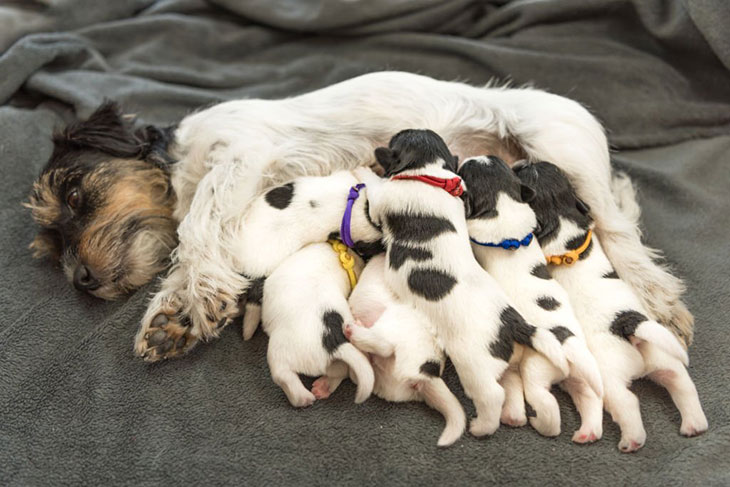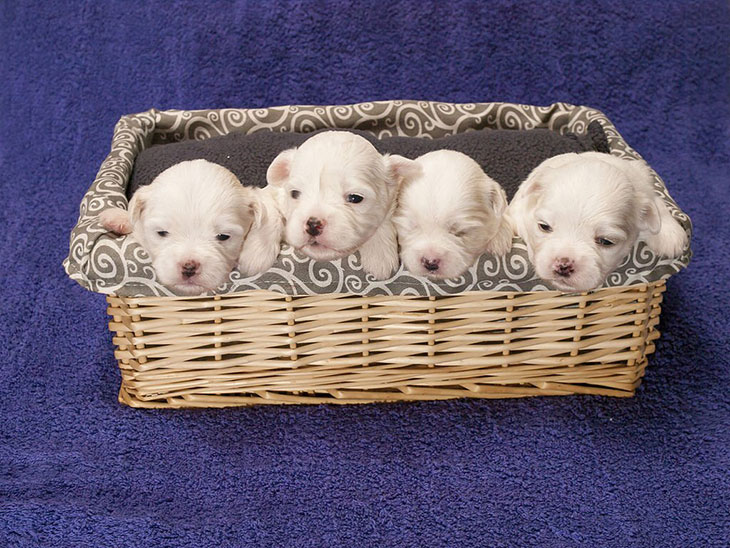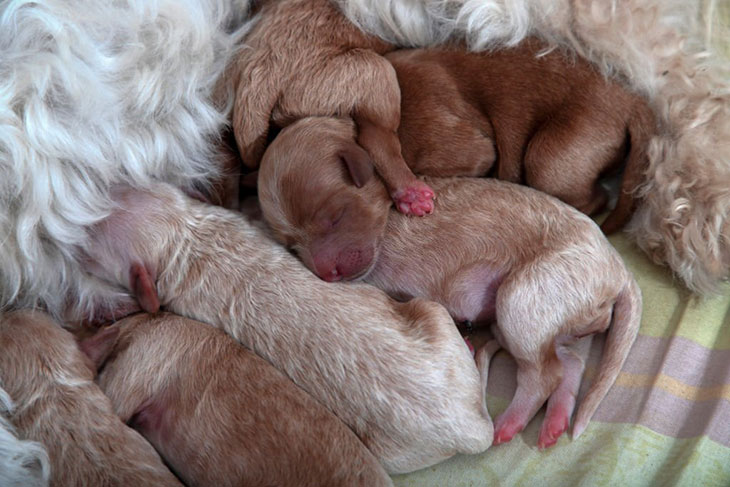Why do dogs have so many puppies? Are you struggling to reach a thoughtful answer?
If this curiosity also costs you a lot of time to learn, don’t miss our post today, which will be a wise option. We will unveil a satisfactory answer to the topic.
However, before coming to a conclusion, we are going to walk through four interesting sections ( a brief answer to the key question today, what factors influence litter size, why dogs can have many puppies, and address some common questions about this aspect).
What are you waiting for? Join me now to encounter the truth.
How Many Puppies Do Dogs Have?

Most reliable vets will recommend we allow our dogs to have approximately 4 to 6 litters and 4-6 puppies in each litter.
Each adult dog have average litter size around 4 to 6 litters in her life. According to responsible breeders, the average size of puppies delivered in each litter of puppies should be from 5 to 6.
Then doggo moms could be spayed at their healthiest and still young.
Reputable breeders suggest this solution which might help them to avoid hard deliveries that are the root of some popular problems of uterine infections or recurrent mastitis.
Therefore, a dog can have a total average of 20 to 26 puppies in her life before spaying.
Nevertheless, the number of small dogs given to doggo moms depends on various factors, including their overall health, age, and breed.
There are certainly some exceptions. A lot of dogs have puppies that are beyond the scope of the range. Some just birth an individual puppy, whereas others are moms of more than 22 or 25 puppies.
A vet might attempt to take some X-RAY or check the dog’s belly to unveil some reasonable estimate of how many the mommy dog will deliver.
In addition, it is up to the dog breed, there are some different amount of puppies for each litter.
Smaller dogs:
- Chihuahua: She can give a birth to 3 pups in a each litter.
- Dachshund: Average 4 – 5 pups in a each litter.
- Yorkie: Average number is 3.3 pups per litter.
Medium-sized Dogs:
- Labrador Retrievers: They can have 5 to 10 puppies for a litter.
- Boxer: A Boxer can give birth to a litter of between 5 – 7 puppies in one go.
Larger dogs:
- Golden Retriever: Up to 12 pups a litter.
- German Shepherds: Up to 15 pups a litter.
So, how to know exactly number for each breed. No worry! let’s move to next part.
What Determines The Number Of Puppies In A Litter?
A pet breeder or owner can select their pup’s breed, choose the optimum time to breed, and choose which nutritious meals to feed them.
These factors might impact on puppies delivered, yet nothing is certain about the volume of their litter size. That depends on Mother Nature.
However, I, who have some experience raising a pet, can mention some factors which may impact the size of your dog’s litter, including the breeds of dog, humans, genetics, nutrition, and the ages for breeding.
Among these aspects, we can say that the breed of dog is the key factor in determining the size of a dog.
Why Do Dogs Have So Many Puppies?

There are two key roots to why and how do dogs have so many puppies, including genes at random and have different fathers.
Genes At Random
Parents run in the blood 50% of the genetic structures in dogs to their next generation. Nevertheless, the offspring inherit the makeup of the DNA at random.
The outcome of this biological process, called genetic reshuffling or genetic recombination, is that the real genetic structure of small dogs in the litter changes.
The root does not normally generate significant differences in pure-bred dogs as the original generation is genetically similar.
Still, in mixed dogs, which are various in terms of genes, the diversity in genetic makeup usually offers diverse breed rates, predispositions, and physical traits.
Have Different Fathers
In dogs, dams generate multiple eggs at the same time; that is also the reason why they normally deliver to litters instead of only pups.
Also, they are available in heat, which means that these eggs are still ready to fertilize in the uterus (fertile period) for approximately 10 days.
As this four-legged animal is polygamous, female individuals will copulate with any free male dogs while their eggs are in heat.
As a consequence, offspring in the same litter might indeed have different dads.
The genetic variant among pups with various fathers is more different than puppies who have the same dad. Puppies who come from the same blood are around 50% genetically similar.
Otherwise, in the case of more than one male in the same litter, the uterine siblings are just 25% genetically related.
This might generate a great difference in breed ancestry outcomes – and significantly different appearance pups -within the same litter.
FAQs

Can Dogs Only Have 1 Puppy?
A brief answer to this query is yes, they can, but pretty rare.
A dam will produce a litter of 4 to 6 puppies at the same time. The percentage of giving birth to only one pup is not common.
This can trigger some behavioral issues for the pup growing up without siblings, such as loneliness or hard social interactions.
What To Do If My Dog Has Too Many Puppies?
Below are some steps you can consider after your dog has too many pups related to postpartum nursing, nutrition, and care (after the time of conception).
- Keep your dam on a rich-calorie meal (quality food)
- Prepare a private, quiet, clean, and low-traffic space for your pet and her puppies (animal house)
- Monitor nursing
- Contact a reliable vet if Your pet Seems Sick ( (medical conditions)
- Consider spaying
Final Thoughts
Until these last words, I bet you are completely confident to answer the question, Why do dogs have so many puppies?
By and large, there are two main reasons to explain a female dog, which is rare to have only a pup in each in full bearing. They stem from genes and different dads.
No matter how many puppies your dog produces in a litter, you should put more consideration into taking care of her after postpartum, especially nursing, nutrition, environment, and even neutering (if necessary to ensure your dog stays healthy).
Thank you for your company. It’s the right time to say goodbye. See you soon in my useful posts.
